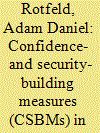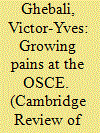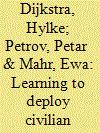|
|
|
Sort Order |
|
|
|
Items / Page
|
|
|
|
|
|
|
| Srl | Item |
| 1 |
ID:
083348


|
|
|
|
|
| Publication |
2008.
|
| Summary/Abstract |
Every region has to elaborate its own confidence- and security-building measures (CSBMs) culture, while not abandoning the basic Organization for Security and Cooperation in Europe (OSCE) accords in this field. CSBMs cannot be seen as an aim in themselves. They have to be incorporated in the broader, emerging security regime. If our security is threatened, both internally and externally (from territories far away from Europe), our counteraction must correspond to the new nature of these threats. Although played down, the concept of CSBMs is not a thing of the past and may be a useful instrument in addressing various kinds of security issues, including those on the Korean peninsula. There is an urgent need to start a serious discussion on the overall concept of arms control and CSBMs and its place in the security-building processes. The main forum for European CSBMs remains the OSCE, although arms control efforts are also being developed outside its remit. The promotion of endeavors in this field would be much enhanced by having the European Union and NATO engaged more deeply in it. The question of CSBM implementation in the contiguous areas of the states which share frontiers with non-European, non-OSCE states remains outstanding. The current circumstances on Europe's perimeter bear evidence that the OSCE community cannot defer the issue interminably. The OSCE Partners for Cooperation need to be further encouraged to follow and get involved in the CSBM/arms control processes.
|
|
|
|
|
|
|
|
|
|
|
|
|
|
|
|
| 2 |
ID:
066136


|
|
|
| 3 |
ID:
127480


|
|
|
|
|
| Publication |
2013.
|
| Summary/Abstract |
I WOULD LIKE to start with a simple statement. It has become a commonplace that in the conditions of formation of a polycentric international architecture not a single or even a limited group of countries any longer has sufficient resources to address global security issues, including those related to new threats and challenges.
Security is indivisible. This means that there is currently little prospect in trying to create an island of well-being in isolated areas cut off from the outside world; or to build an individual relationship with this island, aiming to improve one's own status. The close interdependency between participants in international intercourse, and the transboundary nature of today's threats cast doubt on this kind of options.
|
|
|
|
|
|
|
|
|
|
|
|
|
|
|
|
| 4 |
ID:
170754


|
|
|
|
|
| Summary/Abstract |
nternational organizations continuously deploy civilian capabilities as part of their peacekeeping and crisis management operations. This presents them with significant challenges. Not only are civilian deployments rapidly increasing in quantity, but civilian missions are also very diverse in nature. This article analyses how international organizations have learned to deploy their civilian capabilities to deal with a growing number and fast evolving types of operations. Whereas the previous literature has addressed this question for individual international organizations, this article uniquely compares developments in the United Nations (UN), European Union (EU) and Organization for Security and Co-operation in Europe (OSCE), three of the largest civilian actors. Drawing on the concept of organizational learning, it shows that all three organizations have made significant changes over the last decade in their civilian capabilities. The extent of these changes, however, varies across these organizations. The article highlights that the EU, despite its more homogeneous and wealthier membership, has not been able to better learn to deploy its civilian capabilities than the UN or OSCE. We show that the ability of these organizations to learn is, instead, highly dependent on institutional factors.
|
|
|
|
|
|
|
|
|
|
|
|
|
|
|
|
| 5 |
ID:
011288


|
|
|
|
|
| Publication |
Dec 1996.
|
| Description |
401-408
|
|
|
|
|
|
|
|
|
|
|
|
|
|
|
|
| 6 |
ID:
057332


|
|
|
| 7 |
ID:
075022


|
|
|
|
|
| Publication |
2006.
|
| Summary/Abstract |
Overcoming the legacy of the past is never easy. Add in a brewing ethnic conflict in the south, and the task of supporting the institutional transition from a politicised and autocratic police force into a viable and democratic police service and you begin to understand the daunting task facing the Serbian government and its partner, the Organization for Security and Cooperation in Europe (OSCE) in the months following the overthrow of the Milosevic regime in October 2000.
The OSCE's role as an independent broker was essential in negotiating a path between a demoralised and outdated police force and a sceptical, untrusting public. Now some six years since the start of the police reform process, it is safe to say that the police service in Serbia today is distinctly different from the one that was inherited from the Milosevic government. Much, however, remains to be done for it to be a truly modern, representative and democratic service. This paper provides an 'inside' take on the OSCE's engagement with the Serbian police reform process, its institutional strengths and limitations. Through the lens of the years 2000-2004, this paper will critique the ability of the OSCE to support police and security reform processes. As such the article will assess how the OSCE and the Serbian authorities responded to the challenges facing the policing sector in the post-Milosevic Serbia.
|
|
|
|
|
|
|
|
|
|
|
|
|
|
|
|
| 8 |
ID:
000794


|
|
|
|
|
| Publication |
Vienna, Hafburg Palace, 1998.
|
| Description |
118p.
|
| Contents |
Report of a workshop organised by the governments of Canada, Norway, the Netherlands and Switzerland in association with the British American Information Council(BASIC)
|
|
|
|
|
|
|
|
|
|
|
|
Copies: C:1/I:0,R:0,Q:0
Circulation
| Accession# | Call# | Current Location | Status | Policy | Location |
| 042190 | 355.82/SMA 042190 | Main | On Shelf | General | |
|
|
|
|
|
|
|
|
|